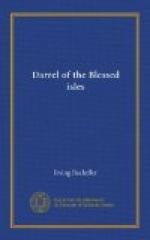“Now the old bear knew what he was talking about. He was, I maintain, a wise an’ remarkable bear. We learn to obey others, so that by an’ by we may know how to obey ourselves. The great master of each man is himself. By words or by knocks ye will learn what is right, and ye must do it. Dear children, ye must soon be yer own masters. There be many cruel folk in the world, but ye have only one to fear—yerself. Ah! ye shall find him a hard man, for, if he be much offended, he will make ye drink o’ the cup o’ fire. Learn to obey yerselves, an’ God help ye.”
Thereafter, many began to look into their own hearts for that fearful master, and some discovered him.
XVI
A Rustic Museum
That first week Sidney Trove went to board at the home of “the two old maids,” a stone house on Jericho Road, with a front door rusting on idle hinges and blinds ever drawn. It was a hundred feet or more from the highway, and in summer there were flowers along the path from its little gate and vines climbing to the upper windows. In winter its garden was buried deep under the snow. One family—the Vaughns—came once in awhile to see “the two old maids.” Few others ever saw them save from afar. A dressmaker came once a year and made gowns for them, that were carefully hung in closets but never worn. To many of their neighbours they were as dead as if they had been long in their graves. Tales of their economy, of their odd habits, of their past, went over hill and dale to far places. They had never boarded the teacher and were put in a panic when the trustee came to speak of it.
“He’s a grand young man,” said he; “good company—and you’ll enjoy it.”
They looked soberly at each other. According to tradition, one was fifty-four the other fifty-five years of age. An exclamation broke from the lips of one. It sounded like the letter y whispered quickly.
“Y!” the other answered.
“It might make a match,” said Mr. Blount, the trustee, smiling.
“Y! Samuel Blount!” said the younger one, coming near and smiting him playfully on the elbow. “You stop!”
Miss Letitia began laughing silently. They never laughed aloud.
“If he didn’t murder us,” said Miss S’mantha, doubtfully.
“Nonsense,” said the trustee; “I’ll answer for him.”
“Can’t tell what men’ll do,” she persisted weakly. “When I was in Albany with Alma Haskins, a man came ‘long an’ tried t’ pass the time o’ day with us. We jes’ looked t’other way an’ didn’t preten’ t’ hear him. It’s awful t’ think what might ‘a’ happened.”
She wiped invisible tears with an embroidered handkerchief. The dear lady had spent a good part of her life thinking of that narrow escape.
“If he wa’n’t too partic’lar,” said Miss Letitia, who had been laughing at this maiden fear of her sister.




